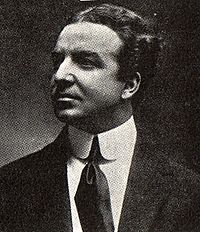Aldo Palazzeschi facts for kids
Quick facts for kids
Aldo Giurlani-Palazzeschi
|
|
|---|---|
 |
|
| Born | 2 February 1885 Florence, Italy |
| Died | 17 August 1974 (aged 89) Rome, Italy |
| Occupation | Poet, novelist, journalist, essayist |
Aldo Palazzeschi (born February 2, 1885 – died August 17, 1974) was the pen name for Aldo Giurlani. He was an Italian writer, known for his novels, poems, and essays. He also worked as a journalist.
Contents
Biography
Aldo Palazzeschi was born in Florence, Italy. His family was well-off and part of the middle class. His father wanted him to study accounting. But Aldo loved theater and acting more.
He chose "Palazzeschi" as his pen name. This was his maternal grandmother's maiden name. He used it so his family's main name would not be linked to acting. His family's money helped him publish his first poetry book. It was called I cavalli bianchi (The White Horses) in 1905. He used his acting pen name for this book.
Later, he met Filippo Tommaso Marinetti. Aldo then became a strong supporter of Futurism. Futurism was an art and social movement. However, Aldo did not always agree with everything the group believed. He disagreed with them about Italy joining World War I. He was against the war. Even so, he was in the military for a short time in 1916.
The 1910s were a very busy time for him. He wrote many works that made him famous. His novel Il codice di Perelà (Man of Smoke) came out in 1911. This book was very important. Marinetti often gave away more copies of Futurist books than he sold. Palazzeschi once said that in 1909, so many copies of one of his books were given away that he couldn't even get one for himself!
Between the two World Wars, he wrote fewer poems. He started working more in journalism. He did not join the official culture of the Fascist regime. But he did work for some magazines that were linked to it. These included Pegaso and Pan. He also wrote for Il Selvaggio.
In the late 1960s and early 1970s, he began writing novels again. These new books helped him become important once more. He died in 1974 in his apartment in Rome.
Legacy
Today, many people see Aldo Palazzeschi as a key influence. He inspired later Italian writers. This includes those in the neoavanguardia movement. His writing is known for its "grotesque and fantastic elements." This means his stories often have strange or imaginary parts.
A French composer named Pascal Dusapin wrote an opera. It is called Perelà, uomo di fumo. This opera was first performed in 2003. It is based on Palazzeschi's novel.
Published works
- I cavalli bianchi (1905)
- Lanterna (1907)
- Poemi (1909)
- L'incendiario (1910)
- Il codice di Perelà (1911)
- Il controdolore (1914)
- Due imperi... mancati (1920)
- L'interrogatorio della contessa Maria (1925)
- La piramide (1926)
- Stampe dell'Ottocento (1932)
- Sorelle Materassi (1934)
- Il palio dei buffi (1936)
- Allegoria di novembre (1943)
- Difetti 1905 (1947)
- I fratelli Cuccoli (1948)
- Bestie del '900 (1951)
- Roma (1953)
- Scherzi di gioventù (1956)
- Il buffo integrale (1966)
- Il doge (1967)
- Cuor mio (1968)
- Stefanino (1969)
- Storia di un'amicizia (1971)
- Via delle cento stelle (1972)
See also
 In Spanish: Aldo Palazzeschi para niños
In Spanish: Aldo Palazzeschi para niños
 | Charles R. Drew |
 | Benjamin Banneker |
 | Jane C. Wright |
 | Roger Arliner Young |

